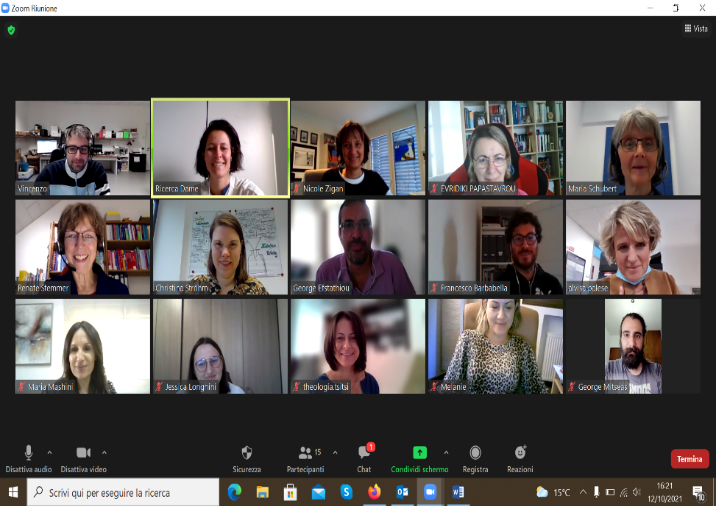In the year 2021, two Transnational Project Meetings were held online in which Partners decided the structure, contents of the course curriculum, methods of delivery and evaluation of the course as well as details regarding the accreditation process.
The contents of the course curriculum were built based on the previous phases of the Project in which reviews of the literature, a qualitative study and online discussion meetings between the Project partners were conducted. Two literature reviews were conducted to map the causes and interventions available in the literature to reduce care rationing and missed nursing care (Schubert et al., 2020). A qualitative study was conducted through focus groups involving managers of nursing homes and hospitals. The aim was to identify the good practices implemented daily by the nurse manager to prevent and reduce missed and rationed nursing. The data were analyzed and published in national and international journals and discussed in the online meetings between the partners to build the course curriculum (Palese A. et al., 2020; Longhini et al., 2021).
Based on these evidence and other studies in the literature, in particular the findings of the RANCARE COST ACTION project, 12 lectures were developed, designed, and recorded, for a total of about 5 hours, held by the members of the Project. The 12 lectures will be available on a dedicated platform. The contents of the course will focus on different aspects that affect the quality and safety of nursing care. Some examples are the quality of the work environment and strategies to improve it, the rationing of care and strategies to prevent it; recommendations and tools for the safe staffing and the management of nursing processes. In addition, an online transnational exchange meeting is planned to share perspectives, doubts, and professional experiences among the participants of the four Partner Countries.
Some lectures were tested in a pre-test phase with a limited number of participants during the month of November 2021. The results of the pre-test evaluation have informed the revision of the entire version of the course which will now be tested in a pilot phase with 80 participants.
The pilot course will be freely accessible from 10 January 2022 for three months from the home page of this site (click the button “subscribe the course”), which will allow you to receive the link for registration and access to the course via e-mail.
The course will be delivered in four languages: English, Italian, German, Greek.
The final version of the course will be delivered as a MOOC (Massive Online Open Course), i.e. an online course with no cost and access constraints starting from September 2022.
Both the pilot and final versions have been accredited by the International Council of Nurses (ICN) with the award of 6 ICN credits; specific national level accreditations of a single country are in the process of being recognized.
Schubert, M., et al.,, & RANCARE Consortium COST Action – CA 15208 (2021). Interventions to prevent or reduce rationing or missed nursing care: A scoping review. Journal of advanced nursing, 77(2), 550–564. https://doi.org/10.1111/jan.14596
Palese, A., et al. (2020). Interventi attuati da infermieri con ruoli manageriali nella pratica quotidiana per prevenire e minimizzare le Missed Nursing Care: risultati di uno studio qualitativo italiano [Effective interventions enacted by Nurse Managers in daily practice to prevent and/or minimize the missed nursing care: Findings from an Italian qualitative study]. Igiene e sanita pubblica, 76(3), 173–186.
Longhini, J., et al. (2021). Strategies to prevent missed nursing care: An international qualitative study based upon a positive deviance approach. Journal of nursing management, 29(3), 572–583. https://doi.org/10.1111/jonm.13176.


